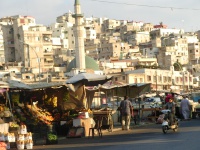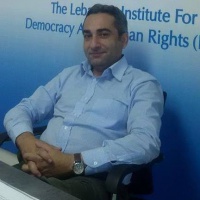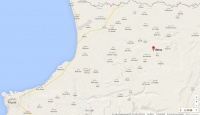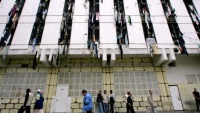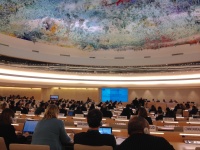Lebanon: Another Case of Confessions Made under Torture
On 14 January 2016, members of the Intelligence forces in civilian clothes stormed into the house of 37-year-old Haytham Fatima in Tripoli. They arrested him and took him to the premises of the Ministry of Defence, where he was secretly detained for ten days.
Lebanon: Lawyer Nabil Al Halabi, at Risk of Prosecution for Criticising the Minister of Interior in a Facebook Post
Nabil Al Halabi, Lebanese lawyer and director of the Lebanese Institute for Democracy and Human Rights (LIFE), has always been a vocal critic of corruption, the use of military courts and torture in Lebanon. Al Halabi has always been actively and frankly expressing his political views on his Facebook account.
With a 15-year delay, Lebanese authorities submit their report to UN Committee against Torture
Lebanon submitted its initial report, overdue since 2001, to the United Nations Committee against Torture (CAT), a body of 10 independent experts, on 9 March 2016. The Convention against Torture (UNCAT) requires that State parties submit an initial report on the measures taken to implement the Convention within one year after its entry into force – 2000 for Lebanon – for the CAT to make comments and issues recommendations.
Lebanon shows limited willingness to improve human rights situation
 On 2 November 2015, the United Nations Member States reviewed the human rights situation in Lebanon in the context of the country’s second Universal Periodic Review (UPR) – an interactive discussion between the State under review and other UN Member States which takes place every four years. During the review, the UN Member States made 219 recommendations to Lebanon in order to improve the human rights situation in the country, most of which were based on concerns raised by NGOs, including Alkarama in its report. Last week, Lebanon presented its views on the recommendations received, accepting 130 of them while only “noting” 89.
On 2 November 2015, the United Nations Member States reviewed the human rights situation in Lebanon in the context of the country’s second Universal Periodic Review (UPR) – an interactive discussion between the State under review and other UN Member States which takes place every four years. During the review, the UN Member States made 219 recommendations to Lebanon in order to improve the human rights situation in the country, most of which were based on concerns raised by NGOs, including Alkarama in its report. Last week, Lebanon presented its views on the recommendations received, accepting 130 of them while only “noting” 89.
Lebanon: Syrian National Tortured by Military Intelligence in Order to Extract Confessions
On 4 April 2016, 21-year-old Syrian baker Malaz Asaad will have the next hearing of his trial. He is facing terrorism charges, which are based on confessions he made under torture while detained in the Rihanyie military barracks in 2014. In view of these facts, on 25 February 2016, Alkarama sent an urgent appeal to the United Nations Special Rapporteur on torture and other cruel, inhuman or degrading treatment or punishment (SRT), Juan E. Méndez, asking him to call upon the Lebanese authorities to open an investigation into the acts of torture he was subjected to and drop all charges based on confessions obtained through torture.
Lebanon: Syrian Citizen Sentenced to 5 Years in Prison on the Basis of Confessions Obtained Under Torture
On 18 May 2015, 25-year-old Syrian citizen Yarub Al Faraj was arrested by members of the Military Intelligence at a military checkpoint in the Bekaa Valley in eastern Lebanon and taken to the Ablah Military Barrack, where he was tortured and forced to confess to accusations of terrorism, which were later used as the basis for his conviction by the Military Court in December 2015. In view of these facts, Alkarama sent on 23 February 2016 a communication to the United Nations Special Rapporteur on torture and other cruel, inhuman or degrading treatment or punishment (SRT), Juan E. Méndez, asking him to call upon the Lebanese authorities to open an investigation into the acts of torture to which Al Faraj was subjected and to retry him, disregarding all confessions obtained under torture.
Lebanon: Working Group on Arbitrary Detention (WGAD) 2014 Opinion on Nahr al Bared
Lebanon: Respect UN Opinion, Release Nahr al Bared Detainees
One year after the adoption by the United Nations Working Group on Arbitrary Detention of an Opinion recognising the arbitrary character of the detention of 72 persons arrested following the 2007 Nahr Al Bared crisis and calling for their immediate release, the majority of them remain detained. All were condemned to heavy sentences on the basis of confessions obtained under torture and after years of pre-trial detention. On the anniversary of this landmark Opinion, Alkarama calls upon the Lebanese authorities to respect their international obligations and release or review the detainees' sentences.
Lebanon: Universal Periodic Review 2015 - Draft Report of the Working Group
Lebanon: UN Member States Express Concern Over Human Rights During Universal Periodic Review
On 6 November 2015, the Working Group on the Universal Periodic Review (UPR) adopted a draft report containing the recommendations made by United Nations Member States to Lebanon during the State's review, which took place on 2 November 2015. During the review, States expressed their concern over Lebanon's human rights situation, especially regarding the pervasive practice of torture, the use of military tribunals for civilians, the death penalty and the delay in establishing an independent national human rights institution (NHRI), all issues previously raised by Alkarama in its report submitted to the Human Rights Council (HRC) in view of Lebanon's review on 23 March 2015.
 Algeria
Algeria Bahrain
Bahrain Djibouti
Djibouti Egypt
Egypt Iraq
Iraq Palestine/Israel
Palestine/Israel Jordan
Jordan Kuwait
Kuwait Lebanon
Lebanon Libya
Libya Mauritania
Mauritania Morocco
Morocco Oman
Oman Qatar
Qatar Saudi Arabia
Saudi Arabia Sudan
Sudan Syria
Syria Tunisia
Tunisia United Arab Emirates
United Arab Emirates Yemen
Yemen Other Countries
Other Countries

